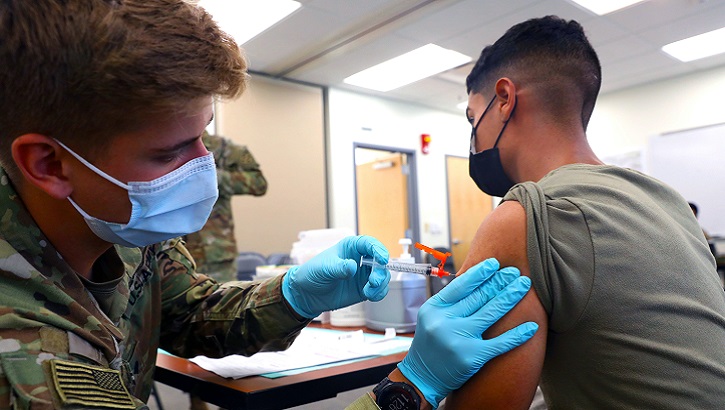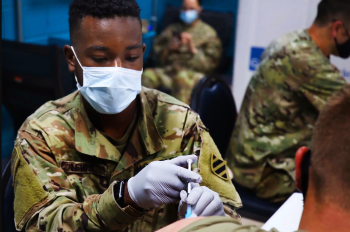Secretary of Defense Mandates COVID-19 Vaccinations for Service Members
 Army Spc. Tyler Boyer administers the COVID-19 vaccine to another soldier at Fort Carson, Colo., Aug 3, 2021. Secretary of Defense Lloyd J. Austin III issued a memorandum directing mandatory COVID-19 vaccinations for service members. (U.S. Army photo by Sgt. Andrew Greenwood)
Army Spc. Tyler Boyer administers the COVID-19 vaccine to another soldier at Fort Carson, Colo., Aug 3, 2021. Secretary of Defense Lloyd J. Austin III issued a memorandum directing mandatory COVID-19 vaccinations for service members. (U.S. Army photo by Sgt. Andrew Greenwood)
The Secretary has determined - after careful consultation with medical experts and military leaders and with the support of the president - that mandatory COVID-19 vaccinations for service members are necessary to protect the health and readiness of the force, Kirby said.
On Aug. 23, the FDA gave full approval to the Comirnaty vaccine - previously known as the Pfizer-BioNTech vaccine - for individuals 16 years of age and older. Before Aug. 23, the vaccine was available for use through and FDA emergency use authorization.
Kirby said vaccines other than Cominaty will not be made mandatory, but that could change if the FDA issues full approval for others.
The memo directed the secretaries of the military departments to immediately begin full vaccination of all members of the department on active duty or in the Guard or Reserve, who aren't yet fully vaccinated against COVID-19.
Service members who are actively participating in COVID-19 clinical trials are exempt from mandatory vaccination until the trial is complete to avoid invalidating clinical trial results, the memo states.
 Army Spec. Dorien Lewis, a combat medic with Division Sustainment Troops Battalion MEDOPS, 3rd Division Sustainment Brigade, administers the Moderna COVID-19 vaccine to an Army soldier at Camp Arifjan, Kuwait, Aug. 17, 2021. Medics across Camp Arifjan held a COVID-19 vaccine drive for personnel that are not fully vaccinated (Photo by: Army Sgt. Marquis Hopkins).
Army Spec. Dorien Lewis, a combat medic with Division Sustainment Troops Battalion MEDOPS, 3rd Division Sustainment Brigade, administers the Moderna COVID-19 vaccine to an Army soldier at Camp Arifjan, Kuwait, Aug. 17, 2021. Medics across Camp Arifjan held a COVID-19 vaccine drive for personnel that are not fully vaccinated (Photo by: Army Sgt. Marquis Hopkins).
The secretaries are also directed to "impose ambitious timelines for implementation and to report regularly on vaccination completion using establishment systems for other mandatory vaccine reporting," the memo states.
"The secretary has communicated to the military department to execute this mandatory vaccination program with, obviously, skill and professionalism, which we also do, but also with a measure of compassion," Kirby said.
Service members with preexisting conditions who are advised against being vaccinated by their doctors would be exempt from mandatory vaccinations, Kirby said, adding their may also be possible exemptions on religious grounds.
Service members outside those two categories who still object will be offered a chance to sit down with a physician and have that physician communicate to them the risks that they're taking by being unvaccinated, Kirby said.
They'll also be offered a chance to sit down with those in their chains of command to talk about the risks that their objection will impose on the unit and on the fore on their teammates, he added.
"Commanders have a wide range of tools available to them to help their teammates make the right decision for themselves, for the families, for their units, and the secreatroy expects that they commanders will use those tools, short of having to use the UCMJ," he said, referring to the Uniform COVID of Military Justice.